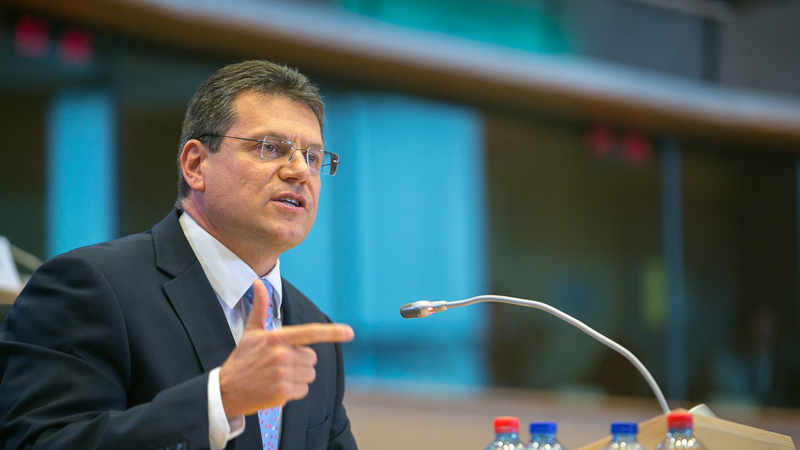The Slovakian will replace Frans Timmermans as the EU’s lead on climate, at home and abroad
The European Commission has put Slovakia’s Maroš Šefčovič in charge of its climate policy, at least temporarily.
The Commission, the European Union’s executive arm, announced yesterday that the current long-time climate lead Frans Timmermans officially resigned to campaign to become prime minister of his native Netherlands.
His role leading on climate policy would go to Šefčovič “until the appointment of a new member of the commission of Dutch nationality”, they said. All 27 member states need to be represented in the commission.
The seasoned Slovakian politician is a staunch believer in gas as a “transition fuel”, but he has also overseen an expansion in renewables and energy efficiency as energy commissioner.
Germany set to miss net zero by 2045 target as climate efforts falter
It is not clear how long the Slovakian will lead on climate. A new commissioner is likely to be appointed by the Dutch government before their national election on 22 November.
But Manon Dufour, the head of E3G’s Brussels office, said a new commissioner is unlikely to be given a high-profile job so Sefcovic will probably have the role at least until the current administration ends its term in November 2024.
Brussels big-shot
Šefčovič is a European Union veteran. After serving as Slovakia’s ambassador in Brussels from 2004 to 2009, his national government picked him for the commissioner role.
Since then, he’s led on a variety of issues like education, energy, health and consumer policy.
Announcing his appointment, the Commission’s president Ursula Von Der Leyen said: “Having successfully dealt with the most challenging files in the past, Maroš Šefčovič is one of the most senior and experienced members of my college.”
Ecuadorians reject Amazon oil drilling in historic referendum
E3G’s lead in Brussels Manon Dufour told Climate Home he was the “best person for the job given his experience, credibility and networks”.
Friederike Röder, vice-president of Global Citizen told Climate Home he was “seen as a heavyweight in EU politics and now needs to prove he can use his clout to push ambition in international climate diplomacy”.
Gas buyer in chief
Šefčovič has been central to the European Union’s push to get off Russian gas, first as the energy commissioner after Russia first invaded Crimea and then in his current vice-president role after the rest of Ukraine was invaded.
Over this time, Šefčovič has sought to replace Russian gas with gas from other countries like the US and Azerbaijan and still claims gas is a “very important transitional fuel”.
On a trip to the US in February, he said that the EU could keep buying gas right up to its 2050 net zero target date. “We have still – we have still 30 years to go,” he said.
On the same trip, he told US gas producers to “keep it coming”. He said the EU needed more gas import terminals and pipelines and he hoped they “will fast track incorporation and arrival of big quantitities of [liquified natural gas] to Europe”.
“Basically, his job over the past two years has been to find other [non-Russian] sources of gas”, said Dufour. “The challenge now for him in this position would be to look beyond that and to look at how we actually reduce or almost eliminate European gas demand”.
In February, Šefčovič said that all different types of hydrogen are needed including so-called blue and grey hydrogen, which are made with fossil fuels.
Dufour said that green hydrogen, which is made with renewable energy, is “the only sensible solution going forward” and “the other colours of it are dead ends”.
On the other hand, Dufour said that Šefčovič had pushed forward renewables, energy efficiency and improvements in Europe’s electric grid as energy commissioner. He “did pret
Read More

